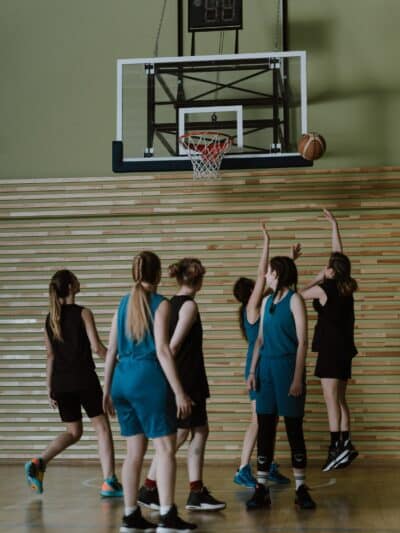Back to school time means a return to routines, structures, and academic pursuits. And, for many families, this time of year also means a ramp up in extracurriculars, now often referred to as “co-curriculars” in many school settings. Why “co” instead of “extra”? Schools realize that these activities play a vital role in shaping your teens’ growth, helping them socialize, discover talents, try new interests, and, in today’s achievement-oriented culture, provide a much-needed balance to the rigors of academics.

And the key word in that last sentence is “balance”. Achievement culture can also bleed into other aspects of kids’ lives beyond the classroom. Thus it’s important for families to guide their kids towards meaningful co-curricular involvement while still leaving room for the other critical components of teens’ health, including self-care, proper sleep, and down time.
The upsides of extracurriculars
Whether it’s joining the math club, participating on the swim team, or auditioning for a play, extracurriculars contribute significantly to your teens’ social and emotional development. They provide a laboratory for kids to experiment with the good type of risk taking during adolescence. Through sports, clubs, fine and performing arts, and volunteerism, kids can pursue new interests, uncover hidden talents, make friends, and try out leadership roles. In doing so, teens can find a sense of purpose, achievement, and personal fulfillment that might not be as readily attainable within the confines of the classroom; this is especially true for kids who dislike or struggle in school.
In addition, extracurriculars help kids feel connected to their schools, peers, and communities, which research shows can be a protective factor as teens age. Kids who feel connected to something bigger than themselves are less likely to engage in substance use and are more likely to have better mental health outcomes.

Further, as your teens embark on the path to higher education, it’s worth noting that selective colleges and universities value more than just academic excellence. Kim Coughlin, Director of College Counseling at Severn School, reminds her students that colleges “look to other factors, including extracurricular involvement. Admissions officers want to admit students who will be active campus community members. They want to admit students who will seek leadership positions and be changemakers. Suppose a student has been highly involved in extracurricular activities and leadership in high school. In that case, they are likely to continue or expand upon that involvement at the college level!”
The slippery slope of over-involvement in extracurriculars
Especially given the reality that college admissions can be swayed in kids’ favor by extracurricular involvement, it’s easy for teens–and parents–to get swept up in the notion of participation for resume-building purposes. When extracurriculars stop feeling fun for teens and start feeling like a job, it may be time for families to step back and reprioritize.
Similarly, if activities start taking precedence over academics, school attendance (hello,multi-day, out-of-state athletic tournaments and showcases), sleep, and socializing, something may need to give.
And it’s not just kids at risk for over-involvement in outside activities. Sometimes parents can become so wrapped up in their kids’ pursuits that they act as surrogate coaches, over-invested cheerleaders, and–worst of all–drill sergeants keeping their kids’ eyes on a long-term goal (usually college). Each of these approaches can tear at the fabric of the part-child relationship.
So how do you support your teen’s extracurricular pursuits?
- Encourage participation. While some teens may eagerly embrace various extracurricular activities, others might not feel compelled to engage immediately. It’s okay for families to set an expectation in this department. “We’d like you to participate in at least one activity outside of your classes every season.”
- Facilitate participation (if your teen seems to need this support). Parents can research extracurricular options and logistics and help teens plan to get involved. “Looks like play tryouts start next Monday afternoon” or “Which day next week would be good for me to drive you to pick up some job applications?” If need be, enlist the help of a trusted adult at school to nudge your child towards an activity that might be a good match.
- Keep it about the kids. Do not let parental hopes and aspirations about your kids’ potential on Broadway, the Olympics, the NFL, or Harvard steal the moment. Not only are such aspirations often way out of whack, they rob kids from being able to simply enjoy their moments.
- Focus on depth rather than breadth. Especially from the college perspective, demonstrating a deep commitment and leadership within a specific activity can be more impactful than a laundry list of superficial involvements. That said, sometimes it takes some trial and error for kids to find their thing, and that’s okay!
Source:
Bond, L., Butler, H., Thomas, L., Carlin, J., Glover, S., Bowes, G., & Patton, G. (2007). Social and school connectedness in early secondary school as predictors of late teenage substance use, mental health, and academic outcomes. Journal of Adolescent Health, 40(4). https://doi.org/10.1016/j.jadohealth.2006.10.013
Note: This blog post also appears as an article on Annapolis Moms Media.








 Steer Clear of the Parenting Comparison Trap
Steer Clear of the Parenting Comparison Trap
Leave a Reply